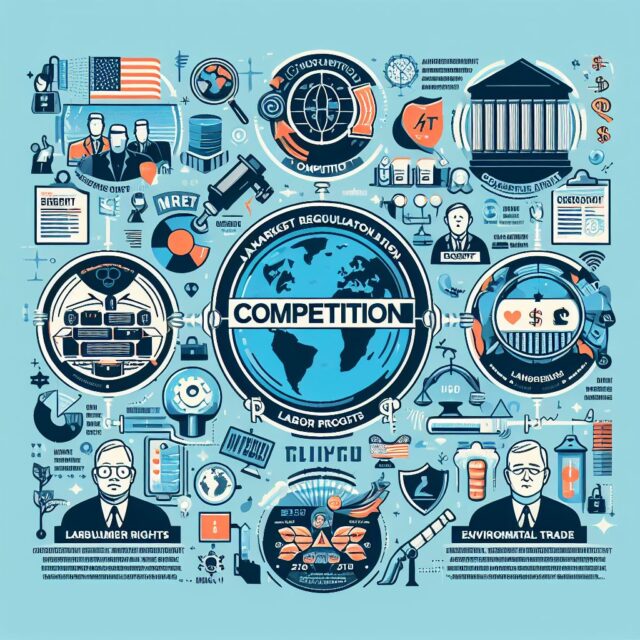
Regulation of Competition is a robust legal framework crafted to encourage fair competition and deter monopoly. It’s poised to shape a fair, dynamic, and resilient business landscape in the UAE. Demonstrates the government’s commitment to fostering a level playing field and promoting innovation.
The United Arab Emirates has recently implemented a substantial legal framework to fortify its commitment to fair market practices and economic development. Federal Decree-Law No. 36/2023 on the Regulation of Competition replaces the prior Federal Law No. 4/2012, adapting to the evolving dynamics of competition in today’s business landscape. This comprehensive legal framework seeks to address and mitigate monopolistic practices while fostering a competitive environment beneficial to economic growth.
Regulation of Fair Competition: Objectives and Scope
At its core, the Decree Law aims to create an environment that not only safeguards but enhances competition. The legislation targets the effectiveness and competitiveness of establishments, consumer interests, and sustainable development within the state. The reach of the law is broad, encompassing all establishments and their economic activities both within and outside the state, even those involving the exploitation of intellectual property rights. Furthermore, economic activities conducted abroad, those that have an impact on competition within the state, are also brought under its purview.
Exemptions and Prohibitions
The law strikes a balance between encouraging healthy competition and preventing anti-competitive practices. While it outlines specific exemptions including agreements overseen by sectoral regulatory bodies, federal government-owned establishments, and those owned by the governments of individual Emirates, it also places stringent prohibitions. Article 5 focuses on restrictive agreements, prohibiting practices that might prejudice, limit, or prevent competition. Article 6 addresses the abuse of a dominant position, ensuring establishments do not engage in activities that obstruct fair competition.
Abuse of Dependency, Offering Extremely Low Prices
The Decree-Law is vigilant against any attempts to exploit economic dependencies. Articles 7 and 8 specifically prohibit establishments from exploiting the economic dependency of customers and from offering prices significantly below production costs to eliminate competitors from the market. These provisions are pivotal in maintaining equilibrium and fairness in the marketplace.
Exemptions and Decision-Making Process
Recognizing that certain agreements or practices may be essential for economic development, performance improvement, or consumer benefits, Article 9 provides exemptions under specific conditions. The decision-making process for exemptions, outlined in Article 10, is meticulous. It includes a timeframe for decision-making, criteria for evaluation, and grants the Minister authority to approve, reject, or conditionally approve agreements.
Economic Concentration, Regulatory Committee, and Penalties
Article 12 introduces a provision regarding economic concentration, requiring establishments to submit applications for operations that could impact competition. The establishment of the Competition Regulatory Committee (Articles 16 to 22) and the definition of penalties for violating the Decree-Law (Articles 23 to 29) are crucial components. These penalties vary based on the nature and severity of violations, encompassing fines, closure of establishments, and the publication of rulings.
Legal Proceedings and Appeals, Enforcement, Fees, and Prescription of Complaints
Articles 31 to 34 elaborate on legal proceedings and appeals, highlighting that competition cases will be heard summarily. The law also empowers specific employees with law enforcement capacity to establish violations (Article 35). The Cabinet is designated the authority to issue a decision prescribing fees for implementing the provisions of the Decree-Law (Article 36). A five-year statute of limitations for complaints related to anti-competitive practices is established under Article 37.
The Implementing Regulation and Abrogations
The legislative journey is not complete without considering Articles 38 and 39. Article 38 directs the Council of Ministers to issue the Implementing Regulation within six months of the Decree-Law’s entry into force. Article 39 revokes Federal Law No. 4/2012 and any conflicting provisions. It emphasizes that regulations, decisions, and laws issued based on the previous law will remain effective until replaced by new ones aligned with the Decree-Law.
In conclusion, Federal Decree-Law No. 36/2023 on the Regulation of Competition stands as a robust and far-reaching legal framework, meticulously crafted to encourage fair competition, deter monopolistic practices, and nurture a competitive market environment for the benefit of economic development and consumer welfare. The comprehensive provisions and regulatory mechanisms demonstrate the government’s commitment to fostering a level playing field, promoting innovation, and ultimately contributing to the nation’s economic prosperity. As the Decree-Law takes effect, it is poised to shape a fair, dynamic, and resilient business landscape in the United Arab Emirates.
